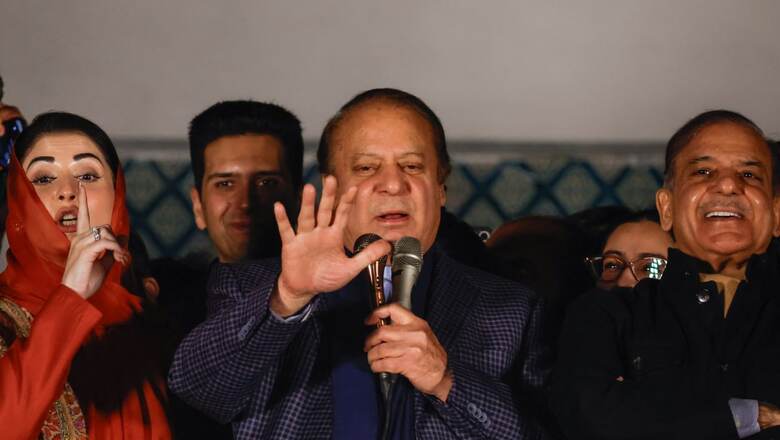
views
With both rivals Imran Khan and Nawaz Sharif declaring victory in Pakistan elections, several meetings have taken place in Lahore in the last 24 hours between PML-N, MQM-P and PPP leaders, which have in total the numerical strength to form the government.
In light of the PML-N’s proposal, the PPP has called its Central Executive Committee meeting in Islamabad on Monday where its demand for the premiership is expected to be decided. According to Pakistan’s daily The Express Tribune, PPP wanted the premiership for itself and is not keen on giving this position to the PML-N.
But analysts say Pakistan’s army favours three-time prime minister Nawaz Sharif to take the reins of the country.
The key points of the discussion included the assessment of Pakistan’s overall situation; deliberations on future political strategies; as well as exchange of recommendations aimed at promoting stability and progress across the board.
What are Imran Khan’s PTI chances?
According to The Dawn, the Pakistan Tehreek-e-Insaf (PTI) has decided to ally with another political party to claim benefit. PTI leader Barrister Gohar Ali Khan had clarified that it will not be reaching out either PML-N or PPP for a possible alliance.
The main hindrance for PTI would be the reserved seats. Despite having the highest number of directly elected members in the assembly, PTI’s status as independents means they do not qualify for the reserved seats for minorities and women, which are allotted to the parties based on the lists provided to the Election Commission of Pakistan (ECP) before the elections, The Dawn reported.
PTI may seek partnership with Jammat-i-Islami, which has three members in Khyber Pakhtunkhwa assembly. Another option is a possible alliance with Majils-i-Wahdatul Muslimeen, one of the key partners of PTI.
The results of Thursday’s elections put Nawaz Sharif’s PML-N in the second position with 75 seats, while Imran Khan’s PTI, backed by independents, was in the lead with 95 out of 264 seats.
What is the status in Provincial Assemblies?
The process to form government and allocation of specific seats in provincial assemblies of Punjab, Sindh and KP has already begun. The ECP has already outlined the procedure for distributing reserved seats.
In Punjab, a majority of 186 seats is required to form the government. The total number of seats in the assembly is 371, out of which, 297 are general seats, 66 reserved for women, and 8 for minorities. As per the current scenario, of the 66 reserved seats for women, 30 are allocated to PML-N, two each to PPP and PML-Q, while the remaining 32 seats will be allocated to the party that the independents will join, according to The Express Tribune.
In Sindh assembly, a party needs 85 seats to secure a government. The total number of seats in Sindh is 168, out of which, 130 are general. From the general seats, 29 seats will be reserved for women and 9 seats for minorities. The PPP is likely to obtain 19 of the 29 reserved seats for women, while six are earmarked for MQM and three are for independent candidates, The Express Tribune reported.
While in the 145-seat KP assembly, 115 are general seats, of which, 26 are reserved seats and 21 seats are contingent upon the inclusion of independent candidates in political parties.
In Balochistan, the total number of seats is 65, and the minimum seat requirement to form the government is 33. Of the 51 general seats in Balochistan assembly, 11 are reserved for women and three for minorities. According to the current party positions, the JUI-F will receive three seats, the PPP and PML-N will receive two seats each for women, and the remaining three seats will be distributed among other parties and one seat for an independent candidate joining any political party, as reported by The Express Tribune.




















Comments
0 comment